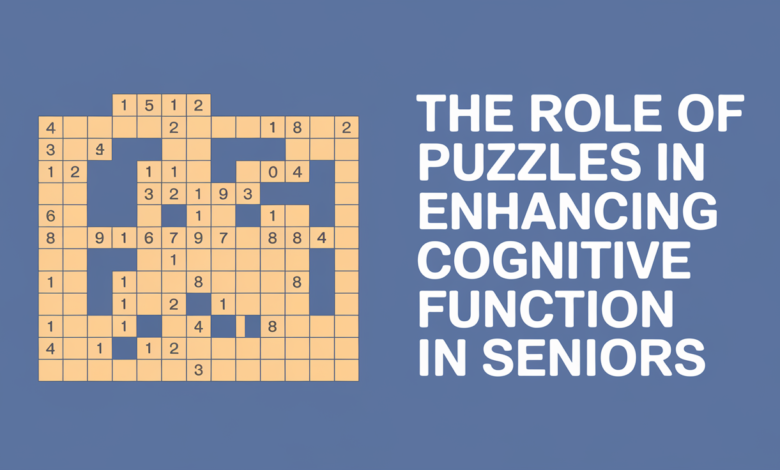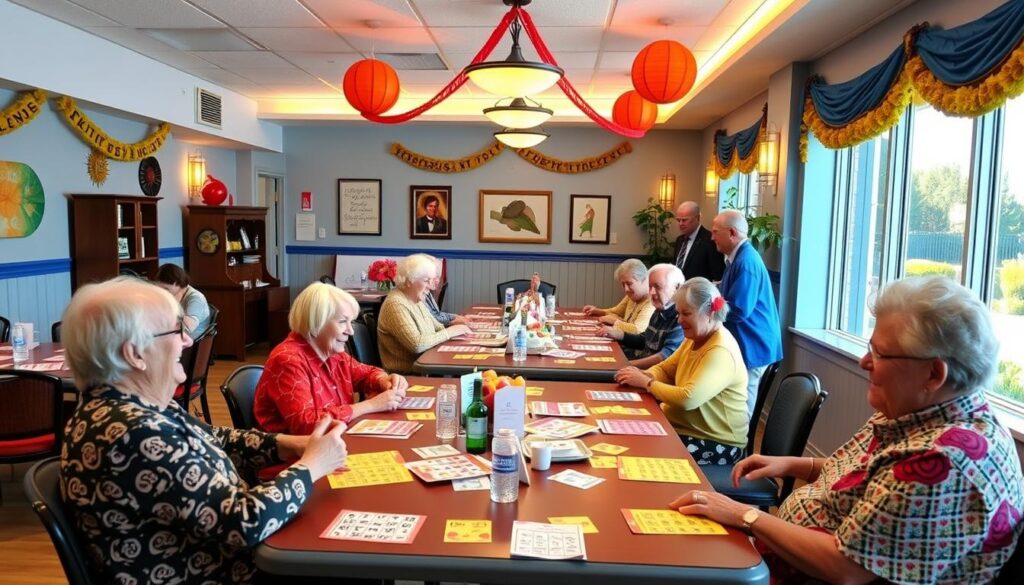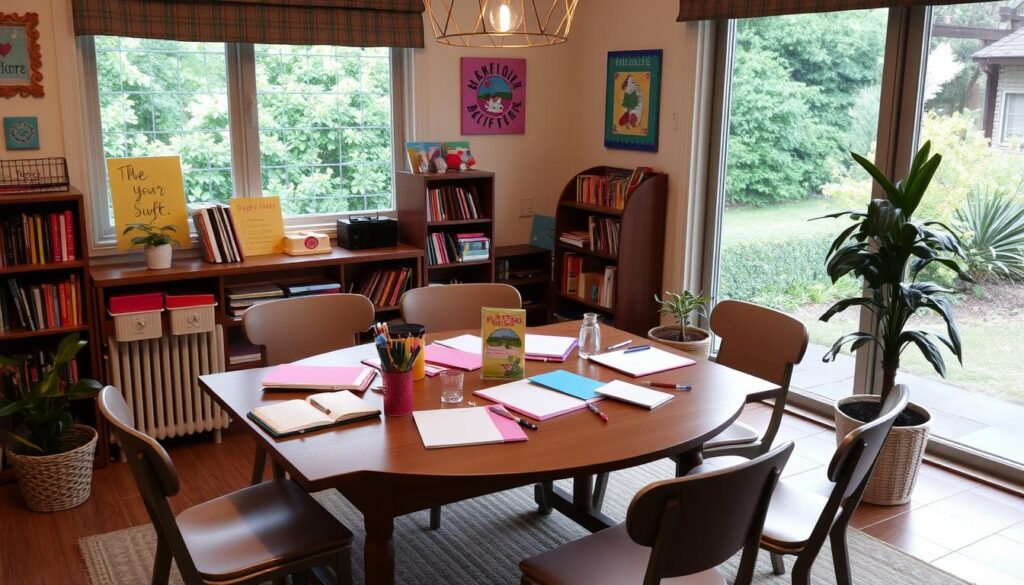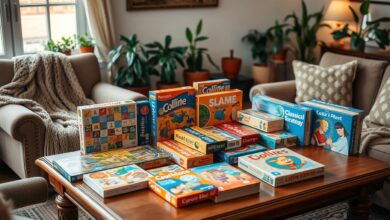Sudoku Puzzles for Seniors with Dementia: Brain Fun

As we age, maintaining cognitive health becomes increasingly important, especially for seniors with dementia. Brain games and mental exercises can offer significant benefits, providing stimulation and therapeutic value for those experiencing cognitive decline. Choosing the right activities tailored to the needs of dementia patients is key.
Sudoku puzzles for seniors with dementia have become a valuable tool for engaging their minds. These logic-based, brain-stimulating puzzles not only foster a sense of accomplishment but also support cognitive function, enhance memory, and promote a positive mindset. Regularly practicing Sudoku can help dementia patients improve problem-solving skills, boost concentration, and enhance mental well-being.
Table of Contents
Key Takeaways
- Sudoku puzzles can provide cognitive benefits for seniors with dementia, including improved problem-solving and memory skills.
- Engaging in brain games and mental exercises can have a positive impact on the overall well-being of dementia patients.
- Choosing the right activities that cater to the specific needs and sensitivities of dementia patients is crucial for effective cognitive stimulation.
- Sudoku puzzles offer a sense of accomplishment and can foster a positive outlook for those living with dementia.
- Regularly practicing Sudoku and other engaging brain teasers can help strengthen cognitive abilities and improve concentration in dementia patients.
The Benefits of Brain Games for Dementia Patients
As people age, certain areas of the brain, including those involved in learning and memory, can start to shrink. Communication between nerves in the brain can weaken, and blood flow can decrease, leading to normal age-related changes in cognition. Brain games and puzzles, such as Sudoku and crosswords, have been suggested as a way to minimize these effects and keep the brain sharp. However, the effectiveness of puzzles is debated, with some researchers believing they may only provide short-term benefits, while others suggest they can help maintain cognitive function. A balanced approach, addressing various risk factors for cognitive decline, is recommended for dementia patients.
How Brain Games Can Help Improve Cognitive Function
Research has shown that cognitive stimulation can enhance memory, attention, and problem-solving skills in individuals with dementia. Incorporating brain games into the daily routine of those with dementia can provide structure and predictability, reducing anxiety and confusion. Types of brain games for seniors with dementia include puzzles, memory games, word games, number games, board games, card games, and technology-based games. These activities can help keep the mind active and engaged, potentially slowing the progression of cognitive decline.

The Importance of Choosing Appropriate Activities
Dementia patients commonly experience feelings of isolation and loneliness. By engaging in brain games, individuals can interact with others, fostering social connections and a sense of community. Additionally, the challenges presented by these games can provide a sense of accomplishment, boosting self-esteem and overall well-being. When selecting brain games for dementia patients, it is crucial to choose activities that are appropriate for their cognitive abilities and interests. This can ensure that the games are enjoyable, stimulating, and beneficial for the individual’s cognitive health.
| Brain Game | Benefits for Dementia Patients |
|---|---|
| Sudoku | Exercises logic and reasoning skills, provides a sense of accomplishment |
| Crossword Puzzles | Engages multiple brain regions, activates the cortex, and strengthens the hippocampus |
| Card Games (Solitaire, Gin Rummy, Poker, Go Fish) | Promote social interaction and flex multiple brain skills |
| Memory Games | Exercise short-term memory and recall abilities |
| Video and Online Games | Build cognitive skills, including memory, in a modern and engaging format |
By incorporating a variety of brain games for the elderly, cognitive exercises for dementia patients, and mentally stimulating pastimes for older adults, individuals can work to maintain their cognitive function and enhance their overall well-being. A balanced approach, addressing various risk factors for cognitive decline, is essential for supporting the needs of dementia patients.
Online Games for Dementia Patients
Online games and brain exercises can be an effective and convenient way for dementia patients to engage their minds. These digital activities can provide visual stimulation, enhance cognitive abilities, and specifically target short-term memory enhancement – all crucial elements in managing the symptoms of dementia.
Puzzle Games for Visual Stimulation
Puzzle games, such as online jigsaw puzzles or visual logic challenges, can be particularly beneficial for dementia patients. These puzzle games for visual stimulation help improve focus, concentration, and problem-solving skills, all while offering an engaging and enjoyable experience.
Memory Games for Short-Term Memory Enhancement
In addition to visual puzzles, memory games for short-term memory enhancement can be a valuable tool in caring for dementia patients. These brain-stimulating activities, which may involve matching, sequencing, or recall exercises, can help slow the progression of memory loss and improve overall cognitive function.
Many memory care communities, such as Buckner Westminster Place, incorporate a variety of online games and brain exercises into their daily schedules, tailoring the activities to the individual needs and interests of their residents. By providing personalized online games for dementia patients, these memory care services are able to effectively engage and stimulate the minds of those living with dementia.
| Game Type | Benefits | Examples |
|---|---|---|
| Puzzle Games | Visual stimulation, improved focus and problem-solving | Online jigsaw puzzles, logic challenges |
| Memory Games | Short-term memory enhancement, cognitive function improvement | Matching exercises, sequencing games, recall activities |
By incorporating a variety of online games for dementia patients, including puzzle games for visual stimulation and memory games for short-term memory enhancement, caregivers can provide a valuable and engaging way to support the cognitive health of those living with dementia.
Logic and Word Games for Dementia Care
While online puzzle and memory games can be beneficial for dementia patients, logic games and word games also play a crucial role in maintaining cognitive function. These types of games challenge the brain in unique ways, helping to improve strategic thinking, attention, and verbal fluency. By engaging in a variety of mentally stimulating activities, dementia patients can work to maintain and even enhance their cognitive abilities.
For instance, Sudoku puzzles are known for their ability to stimulate logical thinking and problem-solving skills. These number-based games encourage the utilization of brain areas not typically engaged in daily activities, providing a valuable mental workout. Crossword puzzles, on the other hand, challenge seniors to think of fitting words, improving vocabulary, cognitive skills, and concentration levels.
Other popular logic and word games for dementia patients include:
- Jigsaw puzzles, which offer a relaxing yet mentally stimulating activity that can vary in complexity based on the puzzle’s design
- Solitaire and other card games, which help maintain sharp brain functions
- Trivia quizzes, which are effective in stimulating memory and fostering enjoyable social experiences
- Chess and checkers, which enhance mental wellbeing through strategy and planning skills
Many dementia-assisted living facilities also offer digital brain games, such as Lumosity, Elevate, and CogniFit, which provide a variety of games to enhance memory, attention, and critical thinking skills. These apps often include new daily challenges and score-tracking functionalities to keep seniors engaged and motivated.
Consistent research supports the notion that engaging in mentally stimulating activities like logic and word games can lower the risk of cognitive decline and dementia among seniors. By incorporating these engaging and interactive games into their care routines, dementia patients can experience improved quality of life and enhanced cognitive abilities.
“Playing Sudoku can stimulate critical thinking skills, problem-solving abilities, and pattern recognition in seniors, boosting their self-esteem.”
sudoku puzzles for seniors with dementia: A Beneficial Activity
Sudoku puzzles are particularly well-suited for seniors with dementia, as they can help enhance both logic and memory skills. By regularly practicing Sudoku, dementia patients can strengthen their strategic thinking and problem-solving abilities, as well as improve their short-term memory. Additionally, completing Sudoku puzzles can provide a sense of accomplishment and boost self-confidence, which can be valuable for individuals living with dementia.
Enhancing Logic and Memory Skills
Studies have shown that memory games can help seniors improve their short-term memory and logical reasoning skills. Sudoku puzzles, with their varying levels of difficulty, encourage critical thinking and problem-solving, which are essential for maintaining cognitive function in dementia patients. As seniors engage with Sudoku, they exercise their mental faculties, helping to delay the onset of cognitive decline.
Providing a Sense of Achievement
Completing Sudoku puzzles can give seniors with dementia a sense of achievement and pride. The satisfaction of solving a logic-based challenge can boost their self-confidence and provide a much-needed sense of accomplishment. This, in turn, can lead to improved mood, reduced feelings of loneliness, and enhanced emotional well-being – all important factors in managing the symptoms of dementia.
Incorporating Sudoku puzzles, along with a variety of other engaging activities, into the daily routine of seniors with dementia can provide a holistic approach to cognitive and emotional well-being. By stimulating the mind and fostering a sense of achievement, Sudoku can be a valuable tool in the care and support of individuals living with this challenging condition.
Bingo: A Social and Cognitive Game
Bingo is another captivating game that can be highly beneficial for dementia patients. Not only does it provide cognitive stimulation, but it also promotes socialization and interaction. Bingo is a familiar game for many older adults, and playing it with a group of friends or fellow dementia patients can help improve long-term memory, eye-hand coordination, and overall engagement.
The social aspect of bingo for dementia patients can be invaluable in combating the isolation and loneliness that can sometimes accompany dementia. By gathering in a group setting and engaging in a shared activity, dementia patients can experience a sense of belonging and connection, which can have a positive impact on their well-being and cognitive function.
Promoting Socialization and Interaction
Playing social games for dementia patients like bingo encourages social interaction and collaboration among participants. Dementia patients can work together to fill out their bingo cards, cheer each other on, and engage in friendly conversations. This social interaction can stimulate the brain, improve communication skills, and foster a sense of community, all of which are crucial for maintaining cognitive and emotional well-being.

“Bingo allows dementia patients to participate in a familiar and enjoyable activity while also providing an opportunity for social engagement and cognitive stimulation.”
Furthermore, the repetitive nature of bingo can be soothing and comforting for dementia patients, as it provides a sense of structure and familiarity in their daily lives. The anticipation and excitement of waiting for their numbers to be called can also help keep their minds engaged and active.
Crosswords: Expanding Vocabulary and Attention
For dementia patients, crossword puzzles can be a valuable cognitive exercise. These classic word games not only expand vocabulary but also improve attention and focus. While crosswords may be more suitable for those in the early stages of dementia, they can still provide a sense of accomplishment for those with more advanced conditions by adjusting the difficulty level.
Crossword puzzles engage the brain by challenging players to recall words, definitions, and related information. This mental stimulation can help maintain cognitive function and potentially slow the progression of dementia. Additionally, the satisfaction of completing a crossword puzzle can boost a person’s confidence and sense of independence.
According to research, regularly engaging in crossword puzzles and other word games can reduce the risk of dementia by up to 32%. Seniors should aim to spend 20-30 minutes daily on these brain-stimulating activities to see the maximum cognitive benefits.
| Benefits of Crossword Puzzles for Dementia Patients | Potential Challenges |
|---|---|
| Expands vocabulary and language skills Enhances attention and focus Boosts confidence and sense of accomplishment Slows cognitive decline and reduces dementia risk Provides a mentally engaging activity | May be too challenging for those in advanced stages of dementia Requires good eyesight and hand-eye coordination Can be frustrating if the puzzle is too difficult Lack of social interaction if done alone |
To make the most of crossword puzzles for dementia patients, it’s important to choose puzzles that match their cognitive abilities and interests. Involving family members or friends can also make the activity more enjoyable and socially engaging. By incorporating crossword puzzles and other word games for dementia patients, caregivers can help support cognitive function and improve the overall quality of life for their loved ones.
Jenga: Improving Eye-Hand Coordination
For dementia patients, staying mentally and physically active is crucial. One game that can provide both cognitive stimulation and physical benefits is Jenga. This classic wooden block-stacking game is a fun family activity that can engage dementia patients and their loved ones.
Jenga requires players to carefully remove and stack wooden blocks, a task that demands eye-hand coordination and fine motor skills. This physical aspect of the game can help improve dexterity and hand-eye coordination, which can often decline in individuals with dementia. Additionally, the strategic thinking and problem-solving required to successfully remove and stack the blocks can provide cognitive stimulation and challenge the mind.
A Fun Family Game for All Ages
Beyond the physical and cognitive benefits, Jenga also offers a social element that can be beneficial for dementia patients. Playing the game together with family members or caregivers can promote interaction, communication, and shared laughter. The simple rules and accessible nature of Jenga make it a game that can be enjoyed by people of all ages and cognitive abilities, fostering a sense of inclusion and belonging.
Incorporating jenga for dementia patients and other physical games for dementia patients into the daily routine can be a valuable addition to a comprehensive care plan. By engaging the mind, body, and social connections, these activities can help improve overall well-being and quality of life for individuals living with dementia.
“Playing Jenga can encourage fine motor skills and hand-eye coordination, making it a beneficial activity for dementia patients.”
Puzzles: Stimulating the Mind
Puzzles, in all their forms, can be excellent mind-stimulating activities for dementia patients. Whether they are word, number, or classical puzzles, these exercises can help engage the brain and improve cognitive abilities. When selecting puzzles for dementia patients, it is important to choose ones that are tailored to their specific needs and interests, ensuring that the level of difficulty is appropriate and the activity remains engaging and enjoyable.
Choosing the Right Puzzles for Dementia Patients
When it comes to cognitive exercises for dementia patients, puzzles offer a variety of benefits. Studies show that logic puzzles can stimulate dormant neural pathways in older adults, while completing jigsaw puzzles can aid in reducing anxiety and lowering blood pressure levels. Memory games, such as matching games or visual puzzles, are crucial for improving memory and retention in older adults.
- Regular participation in creative activities can lead to being 73% less likely to experience memory or thinking problems.
- Chess can lead to increased IQ and focus after just a few months of playing.
- Stimulating the brain through games can help slow the progression of dementia.
Engaging in puzzles that enhance short-term memory, problem-solving, and hand-eye coordination can be particularly beneficial for dementia patients. Classic board games like chess and checkers, as well as puzzle-based video games, can also stimulate strategic thinking and planning, improving cognitive health among seniors.
| Puzzle Type | Benefits for Dementia Patients |
|---|---|
| Sudoku | Engaging memory and concentration, potentially reducing the risks of Alzheimer’s |
| Crosswords | Promoting stress relief due to the focus and concentration involved |
| Jigsaw Puzzles | Fostering visual-spatial skills and patience, which can benefit cognitive health |
| Word Searches | Enhancing pattern recognition and attention to detail, improving spelling and vocabulary skills |
By carefully selecting puzzles for dementia patients that cater to their individual needs and interests, caregivers can provide engaging and stimulating activities that can help maintain and even improve cognitive function.
The Power of Music for Dementia Care
Music has long been recognized for its therapeutic benefits, and this extends to dementia care as well. Listening to music for dementia patients, as well as actively engaging in musical activities, can have a positive impact on the cognitive and emotional well-being of individuals living with dementia.
Music Therapy: A Therapeutic Approach
Music therapy for dementia is a specialized approach that can help stimulate the brain, improve mood, and promote social interaction for those affected by this condition. Studies have shown that cognitive stimulation approaches, including music therapy, may have positive effects on cognitive measures and daily activities.
Recreational therapy, such as music therapy, has shown remarkable effects in reducing anxiety, enhancing mood, and stimulating memory recall in seniors. The CareYaya program, for example, utilizes AI-powered tools to offer innovative music therapy for dementia and other creative activities to support the well-being of older adults.
“The evidence related to cognitive interventions and cognitive training for dementia care suggests modest improvements in cognitive scores but relatively little impact on daily activities.”
While cognitive training focused on memory strategies can benefit healthy aging adults, particularly when done in groups, the power of music for dementia patients lies in its ability to transcend the challenges of memory loss and provide a meaningful emotional connection.
By incorporating music for dementia patients into their care plan, healthcare professionals and caregivers can help individuals with dementia find joy, reduce anxiety, and maintain a sense of identity and belonging. The therapeutic power of music can be a valuable tool in the holistic approach to dementia care.
Writing: Expressing Thoughts and Memories
In addition to engaging in cognitive exercises like puzzles and brain games, writing can also be a powerful tool for dementia patients. The act of writing activities for dementia patients can stimulate the brain, improve focus, and provide an outlet for emotional expression. Encouraging dementia patients to regularly put pen to paper, whether through journaling, storytelling, or simply expressing their thoughts and feelings, can be a valuable cognitive exercises for dementia patients.
Writing can help dementia patients connect with their memories and sense of self, even as the disease progresses. By drawing on their experiences and recollections, patients can engage in a meaningful activity that taps into their preserved cognitive abilities. This can foster a sense of purpose, self-esteem, and emotional well-being, all of which are crucial for maintaining quality of life.
Moreover, the process of writing can also serve as a form of cognitive stimulation, challenging patients to remember words, organize their thoughts, and express themselves coherently. This mental exercise can help slow the decline of cognitive functions and even improve certain skills, such as attention, language, and problem-solving.
Ultimately, incorporating writing activities for dementia patients into a comprehensive care plan can be a valuable addition to the arsenal of cognitive exercises for dementia patients. By providing a platform for emotional expression, memory exploration, and cognitive stimulation, writing can be a powerful tool in supporting the overall well-being of individuals living with dementia.

“Writing can be a powerful tool for dementia patients, helping them connect with their memories, express their emotions, and engage in valuable cognitive stimulation.”
Drama: A Creative Outlet for Memory Enhancement
While dementia can present numerous cognitive challenges, incorporating drama-based activities into memory care programs can offer a creative and rewarding solution. Participating in drama exercises, such as acting in a short play or performance, can stimulate the brain, improve memory, and foster social interaction for individuals living with dementia.
The process of memorizing lines and collaborating with a group can be a powerful cognitive exercise for dementia patients. As they engage in the dramatic process, they are required to recall information, make decisions, and communicate with others – all of which are key components of maintaining cognitive function. This type of drama activities for dementia patients can serve as an effective cognitive exercises for dementia patients, helping to preserve memory and enhance overall brain health.
In addition to the cognitive benefits, drama-based activities can also provide a much-needed creative outlet for dementia patients. The act of expressing themselves through performance can be empowering and help boost self-esteem. Furthermore, the social interaction inherent in drama exercises can combat feelings of isolation and loneliness, which are common challenges faced by those living with dementia.
“Engaging in drama-based activities can be a transformative experience for individuals with dementia. It not only stimulates the mind but also fosters a sense of community and belonging.”
Memory care programs that incorporate drama-based activities are well-equipped to provide a comprehensive approach to cognitive and emotional well-being for their residents. By leveraging the power of creativity and social engagement, these programs can help dementia patients maintain their independence, enhance their quality of life, and ultimately, delay the progression of their condition.
Gardening: A Calming and Engaging Activity
Gardening is an activity that can be incredibly beneficial for dementia patients. Not only is it a soothing and engaging physical task, but it can also help boost self-esteem, improve focus, and provide a sense of purpose. Tending to plants and watching them grow can be a rewarding experience for those living with dementia, allowing them to connect with nature and feel a sense of accomplishment.
Gardening can be a valuable addition to a balanced approach to dementia care, offering both mental and physical stimulation. It can help seniors with dementia to stay active, improve their hand-eye coordination, and provide a sense of structure and routine. Additionally, the act of caring for plants can trigger memories and spark conversations, fostering social engagement and reducing feelings of isolation.
Boosting Self-Esteem and Focus
For dementia patients, the ability to successfully complete a gardening task can be a major source of pride and satisfaction. The sense of accomplishment that comes from watching a seedling grow or tending to a thriving plant can do wonders for self-esteem and boost overall mood. Gardening also requires focus and problem-solving skills, which can help maintain cognitive function and provide a sense of mental stimulation.
Furthermore, the calming and meditative nature of gardening can help reduce stress and anxiety, which are common challenges for individuals living with dementia. The sights, sounds, and smells of the garden can have a soothing effect, providing a much-needed respite from the confusion and disorientation that often accompanies the condition.
By incorporating gardening for dementia patients into a comprehensive care plan, caregivers and memory care communities can create an enriching, therapeutic environment that supports the overall well-being of those living with this challenging condition. Physical activities for dementia patients like gardening can be a powerful tool in enhancing quality of life and promoting a sense of purpose and independence.
Walking: A Physical Activity for Dementia Patients
While cognitive exercises and activities are essential for individuals with dementia, incorporating physical activities, such as walking, can also be tremendously beneficial. Regular physical activities for dementia patients can improve cardiovascular health, boost mood, and provide a sense of well-being.
Walking is a low-impact activity that can be easily integrated into the daily routine of dementia patients, offering both physical and mental advantages. This simple exercise can help maintain muscle strength, improve balance, and enhance overall mobility, which are crucial for maintaining independence and quality of life.
- Enhances cardiovascular health and circulation
- Boosts mood and reduces symptoms of anxiety and depression
- Provides a sense of accomplishment and purpose
- Encourages social interaction and engagement
By incorporating walking into the care plan, caregivers can help dementia patients stay active, engaged, and connected to their surroundings. This gentle physical activity can be a valuable complement to cognitive exercises, creating a well-rounded approach to dementia management.
| Benefits of Walking for Dementia Patients | Tips for Successful Walking Programs |
|---|---|
| Improved cardiovascular health Enhanced mood and reduced anxiety Increased muscle strength and balance Sense of accomplishment and purpose Opportunities for social interaction | Start with short, manageable distances Provide a supportive, safe environment Incorporate familiar and enjoyable routes Encourage social interaction during walks Monitor for signs of fatigue or distress |
By embracing walking as a physical activity for dementia patients, caregivers can help improve overall well-being and quality of life. This simple yet powerful exercise can complement cognitive exercises, creating a holistic approach to managing the challenges of dementia.
The Importance of a Balanced Approach
While brain games, puzzles, and various activities can be valuable tools in dementia care, it is crucial to take a balanced approach. Addressing the risk factors for cognitive decline, such as high blood pressure, diabetes, and smoking, can help prevent or delay the onset of dementia. Additionally, maintaining strong social connections and engaging in meaningful activities with others can also have a positive impact on the cognitive and emotional well-being of dementia patients.
By adopting a comprehensive strategy that addresses both mental and physical health, as well as social engagement, caregivers can provide the most effective support for individuals living with dementia. This balanced approach ensures that all aspects of the patient’s well-being are taken into consideration, leading to better outcomes and a higher quality of life.
Addressing Risk Factors for Cognitive Decline
Certain lifestyle factors, such as high blood pressure, diabetes, and smoking, have been linked to an increased risk of cognitive decline and dementia. By addressing these risk factors for cognitive decline, caregivers can help slow the progression of the disease and maintain cognitive function for a longer period. This may involve promoting healthy habits, managing chronic conditions, and providing access to appropriate medical care.
Maintaining Social Connections
In addition to cognitive stimulation, social connections play a crucial role in the well-being of individuals with dementia. Engaging in activities that foster social interaction, such as group games, art therapy, or music therapy, can help dementia patients maintain a sense of belonging and emotional support. This, in turn, can improve their overall quality of life and delay the onset of cognitive decline.
By taking a balanced approach to dementia care, caregivers can ensure that the unique needs of each patient are addressed, helping them maintain their cognitive abilities, physical health, and emotional well-being.
“A comprehensive approach to dementia care that addresses both cognitive and social needs can lead to significant improvements in the quality of life for individuals living with the condition.”
Conclusion
In conclusion, engaging in a variety of brain-stimulating activities, including Sudoku puzzles, online games, logic and word games, Bingo, crosswords, Jenga, puzzles, music, writing, drama, gardening, and walking, can be highly beneficial for seniors with dementia. These activities can help improve cognitive function, enhance memory, boost mood, and promote social interaction.
However, it is important to take a balanced approach that also addresses risk factors for cognitive decline and maintains strong social connections. By incorporating a diverse range of mentally and physically engaging activities, caregivers can provide comprehensive support and enhance the quality of life for individuals living with dementia.
The research findings suggest that daily Sudoku completion may delay brain aging by up to 10 years, highlighting the profound impact that brain-stimulating activities can have on cognitive function as we age. While the evidence on activities preserving brain function remains inconclusive, the overall benefits of engaging seniors with dementia in a variety of challenging and rewarding pursuits are clear.
FAQ
What types of brain games and activities are beneficial for seniors with dementia?
Some of the most beneficial brain games and activities for seniors with dementia include Sudoku puzzles, online puzzle and memory games, logic and word games, Bingo, crossword puzzles, Jenga, various types of puzzles, music therapy, writing exercises, drama-based activities, gardening, and walking.
How can Sudoku puzzles help dementia patients?
Sudoku puzzles can help enhance both logic and memory skills for dementia patients. By regularly practicing Sudoku, patients can strengthen their strategic thinking, problem-solving abilities, and short-term memory.
What are the benefits of playing Bingo for dementia patients?
Bingo provides cognitive stimulation for dementia patients while also promoting socialization and interaction. It can help improve long-term memory, eye-hand coordination, and overall engagement.
How can writing activities benefit dementia patients?
The act of writing, whether it’s journaling, storytelling, or expressing thoughts and feelings, can help stimulate the brain, improve focus, and provide an outlet for emotional expression for dementia patients.
Why is it important to take a balanced approach to dementia care?
A balanced approach that addresses various risk factors for cognitive decline, such as high blood pressure and diabetes, and maintains strong social connections, is recommended for providing the most effective support for individuals living with dementia.




